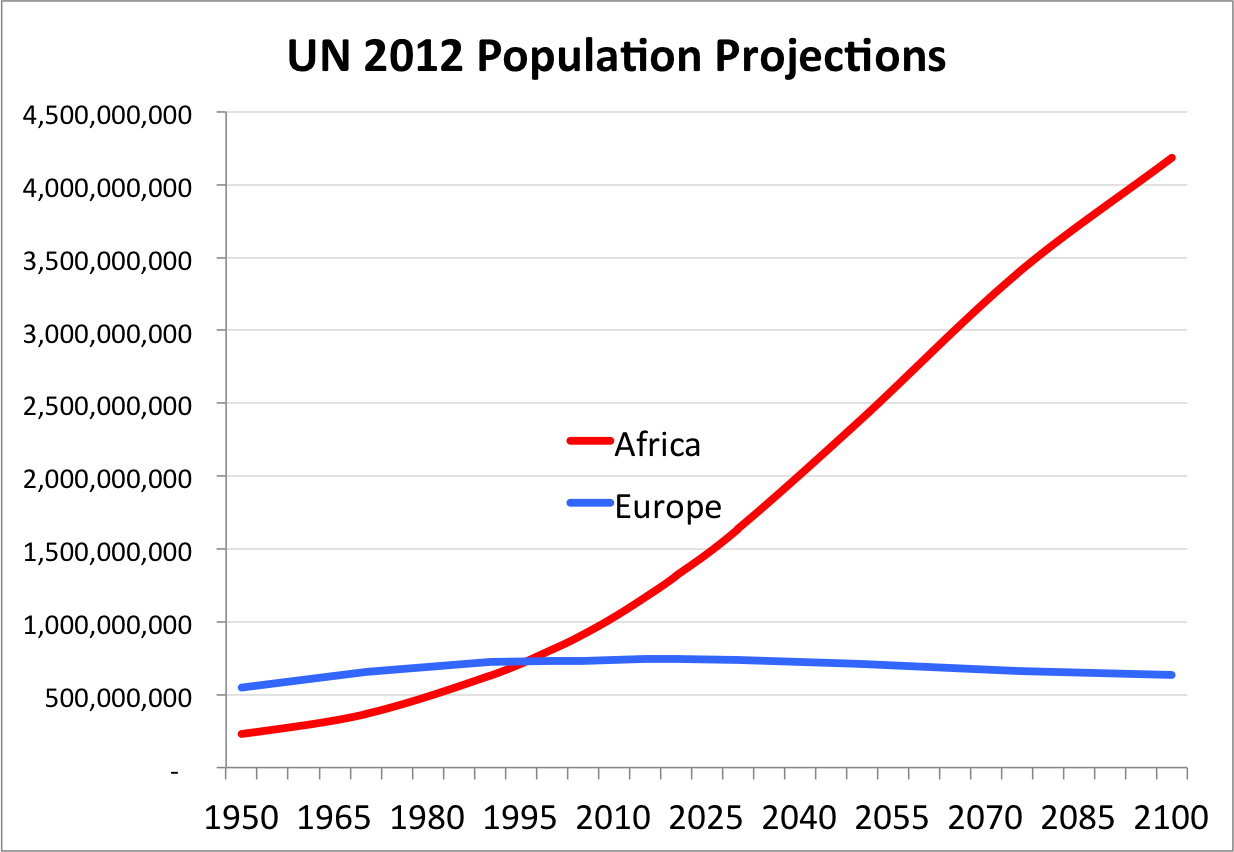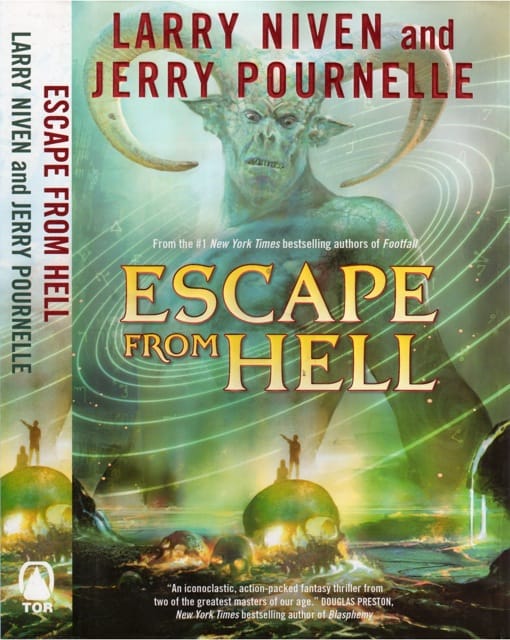The Long View 2007-04-13: Sunspots, Christian Europe, Boomsday, Perpetual Peace
Something John J. Reilly talks about in this post, and something that was really common post 9/11, was the idea that Europeans who were failing to reproduce themselves would be replaced by immigrants from places that had not yet undergone the demographic transition.

Trendlines of central tendency

Versus prediction intervals – but you still don’t see the underlying model
Much of this was, overwrought, at least. However, even as staid a man as Pope Emeritus Benedict XVI talked about it. Demographic predictions are hard, not least because the simple charts that get published obscure the model, and the model assumptions, that underlay them.
The onset and duration of the demographic transition is one of the things that goes into such a model. In the early 2000s, birthrates were really high in much of the Muslim world, sparking some of the concern about the potential Islamicization of Europe. In the decade or so since, birthrates have fallen almost everywhere, except sub-Saharan Africa.
A merely possible future is that Europe could in fact be re-Christianized by an African diaspora. Which would amount to restoring a faith by displacing a people. However, predictions of this sort are very uncertain, and are best addressed very carefully. I would not be surprised if it turned out differently.
Sunspots, Christian Europe, Boomsday, Perpetual Peace
Do you grab people by their lapels and shout at them that global warming is really caused by variations in the solar magnetosphere? If so, you'll find this study comforting, within limits:
Scientists based at the Institute for Astronomy in Zurich used ice cores from Greenland to construct a picture of our star's activity in the past.
They say that over the last century the number of sunspots rose at the same time that the Earth's climate became steadily warmer.
This trend is being amplified by gases from fossil fuel burning, they argue...
Dr Sami Solanki ...is presenting a paper on the reconstruction of past solar activity at Cool Stars, Stellar Systems And The Sun, a conference in Hamburg, Germany...
But the most striking feature, he says, is that looking at the past 1,150 years the Sun has never been as active as it has been during the past 60 years...
Over the past 20 years, however, the number of sunspots has remained roughly constant, yet the average temperature of the Earth has continued to increase...
This is put down to a human-produced greenhouse effect caused by the combustion of fossil fuels.
Again, the mechanism between solar activity and climate is supposed to be the expansion and contraction of the solar magnetosphere. When the magnetosphere expands (as evidenced by an increase in sunspots), it diminishes the amount of cosmic rays that reach the atmosphere. Cosmic rays promote cloud formation; you get fewer of them, you get fewer clouds, you get warmer weather. Recently (very recently, as these things go), temperatures on Earth have continued to rise while sunspot counts remained level (though historically high).
This suggests that there must be some additional factor driving temperatures. For reasons of basic physics, CO2 is a good candidate. On the other hand, it could be that effects of persistently low cloudiness (which would be expected to correlate with persistently high sunspot counts) would be cumulative. The most obvious candidate would changes in albedo, the reflectiveness of the Earth's surface. Warm weather in one year would melt polar and glacial snow, which means that next year the surface would reflect less heat back into space, which would make the world even warmer, which would melt yet more snow. This kind of feedback mechanism does not progress indefinitely, of course. There would eventually be some new point of equilibrium, which could take several decades to reach.
Climate modelers believe that they have taken these feedback mechanisms into account and found them wanting as explanations for the climate changes of the past 20 years. They have done a sufficiently thorough job that the burden of proof now lies with anyone who supports the hypothesis of a transition to a new solar-magnetosphere equilibrium. Well, the behavior of the atmosphere in the next 20 years or so will tell the tale. Meanwhile, the nukes-and-ethanol proposals to stop the rise in CO2 levels have much to recommend them on strategic and economic grounds.
* * *
In the spirit of Easter, last Sunday's New York Times Magazine ran a feature story, entitled Keeping the Faith, by one Russell Shorto. The article is an assessment of the pontificate of Benedict XVI, and particularly of the prospects for Benedict's plan for the re-evangelization of Europe.
It's not a stupid article. The author understands that last year's Regensburg Address by the pope was not about Islam, but about the centrality of essentially religious issues to the European tradition of humane reason. Nonetheless, it is a Times piece. For instance, even though the author does some original reporting by talking to members of the new lay groups for young Catholics, he never quite reports the fact that these are not associations of young progressives chafing under the restraints of orthodoxy, but groups of keen rigorists who think that the hierarchy is too lax. Worst of all, the author talked to the Usual Suspects who have been misinforming the Mainstream Media about Catholic issues for 40 years:
Benedict may be right that the Catholic Church has a world-historic chance to transform Europe and bring about change. But the church’s own strictures could work against that. The paradox may be that for all his stylistic softening as pope, Joseph Ratzinger’s own labors through the decades, applying his life experience with such rigor to protecting and preserving the church, are precisely what prevent Europeans from reconnecting with their roots. “Think of the silencing of theologians in recent decades,” said Father Reese, the former editor of the Jesuit journal America. “The suppression of discussion and debate. How certain issues become litmus tests for orthodoxy and loyalty. All of these make it very difficult to do the very thing Benedict wants. I wish him well. I want him to succeed. But it seems everything he has done in the past makes it much more difficult to do it.”
Yes, think of the lost opportunities. After all, what people chiefly seek in religion is debate about fundamental issues, that and more wonderful choices. It works every time.
* * *
Speaking of the Usual Suspects, Fr. Richard John Neuhaus has a long piece in the May issue of First Things (not yet available online) entitled "The Much Exaggerated Death of Europe." The article is largely a review of Philip Jenkins' new book, God's Continent: Christianity, Islam, and Europe's Religious Crisis. Jenkins, best known for his earlier work, The Next Christendom, argues in his new book that the Eurabian future of Europe will not occur. He puts particular stress on the success of the United States in absorbing large religious minorities, a success that did not seem at all certain in 1925. Fr. Neuhaus does not dismiss these points, but he ends on this note:
At a recent dinner with European intellectuals, I put to an influential French archbishop Daniel Pipes' projection: Either assimilation or expulsion or Islamic takeover. That, he said, puts the possibilities much too starkly. "We hope for the first," he said, while we work at reducing immigration and prepare ourselves for soft Islamization." Soft Islamization. It is a wan expression.
It is also a misleading expression. Only the early parts of the process will be soft.
* * *
For a further example of wishful thinking, we turn to Christopher Buckley's protestations that his new novel, Boomsday, is a satire in the tradition of Jonathan Swift's "A Modest Proposal." That essay suggested eliminating hunger in Ireland by eating the children of the poor:
From Publishers Weekly...Reviewed by Jessica Cutler: In his latest novel, Buckley imagines a not-so-distant future when America teeters on the brink of economic disaster as the baby boomers start retiring. ...a radical but tantalizingly expedient solution to that most vexing of issues, the Social Security problem—[a wildly popular blogger] proposes that senior citizens kill themselves in exchange for tax breaks.
May I ask why anyone thinks this is a joke? The attempts in the 1990s to create a constitutional right to suicide were struck down by the courts, but the courts were reduced to speaking in tongues when they gave their reasons. The fact is that, if you accept the privacy-autonomy-liberty principle of the Griswald-Roe decisions, then there is no coherent reason why people should not have the right to end their own lives. In some places, notably in Holland, the medical system is already making extensive use of this logical extension. We should recall that, even in the US, the autonomy principle created the suicide question: it was the premise for the successful anti-natalist campaign that kept birthrates substantially below replacement levels in the 1970s and '80s, thus ensuring that there would be far fewer workers to support the Boomers in their old age. It would make perfect historical sense if the principle that created the problem should also solve it.
* * *
Ah, for the good old days of total war: John Dillin notes in The Christian Science Monitor that the US effort in Iraq has been attended by a certain lack of seriousness, which is true enough, and points to the decisive success of America's total wars. But what is a total war?
Total war means everything belonging to the enemy is a potential target – their factories, their cities, even their civilians. With clear orders from Roosevelt, generals such as Dwight Eisenhower and George Patton knew what to do. They obliterated Germany's and Japan's will to fight. The cost was high, including hundreds of thousands of civilian deaths in the Axis homelands.
Not really. Total war consists not so much in what you are willing to do to the enemy as what you are willing to do to yourself. The point is mobilization of the whole society, not annihilation of the other side. (The article remarks that there has been a singular dearth of mobilization for Iraq, which is also true.)
Simply for the purposes of discussion, might I suggest that total war, like the state-monopoly socialism with which it was so closely linked from 1860 to 1945, has become anachronistic? The Bush Administration's problem may be that it deployed the rhetoric of total war for an enterprise that would require no such effort, while the military that was deployed had systematically neglected the civil-administration skills that it would need for the 21st century. Similarly, the Perennial Opposition continued to look abroad for foreign allies and models, just as if Stalin were still in his Kremlin and all were right with the world.
What we may need is not Total War, but the ability to conduct Perpetual War, which by and by will become Perpetual Peace.
Copyright © 2007 by John J. Reilly
Support the Long View re-posting project by downloading Brave browser. With Both Hands is a verified Brave publisher, you can leave me a tip too!



Comments ()